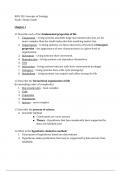Summary
Summary BIOL 211 Concepts of Zoology Exam 1 Study Guide
- Course
- BIOL 211
- Institution
- Millersville University Of Pennsylvania
BIOL 211 Concepts of Zoology Exam 1 Study Guide for chapters 1, 2, 6, 7, 8, and 9. Covering concepts like life, evolution, natural selection, the cambrian explosion, reproduction, and complexity.
[Show more]




